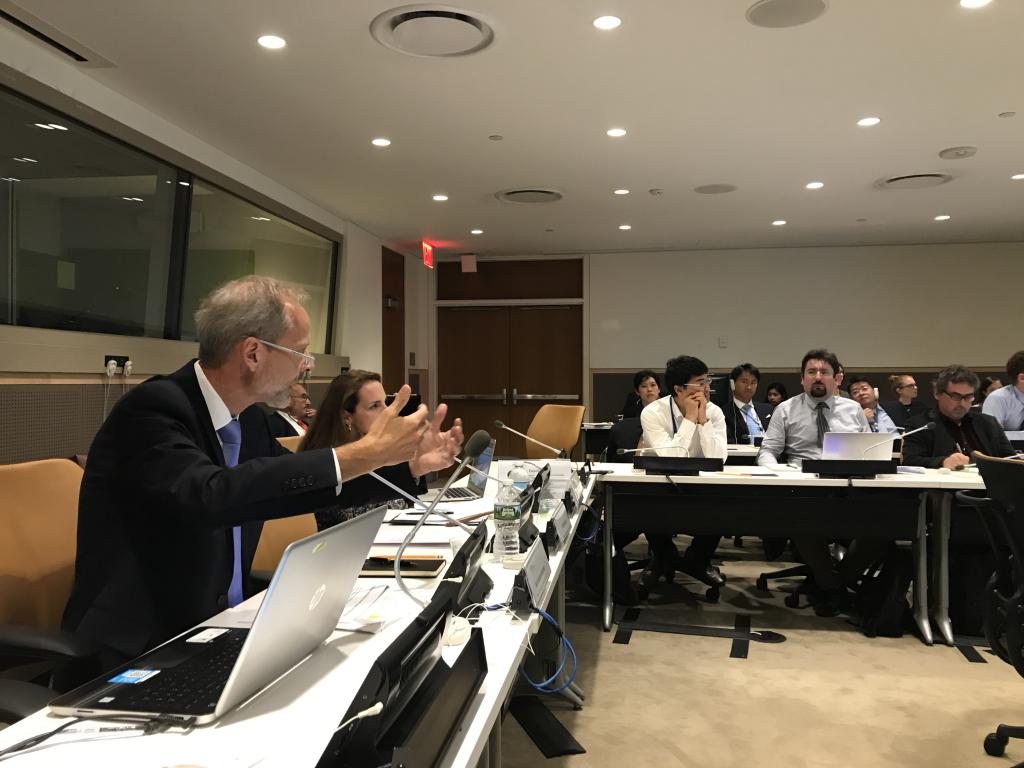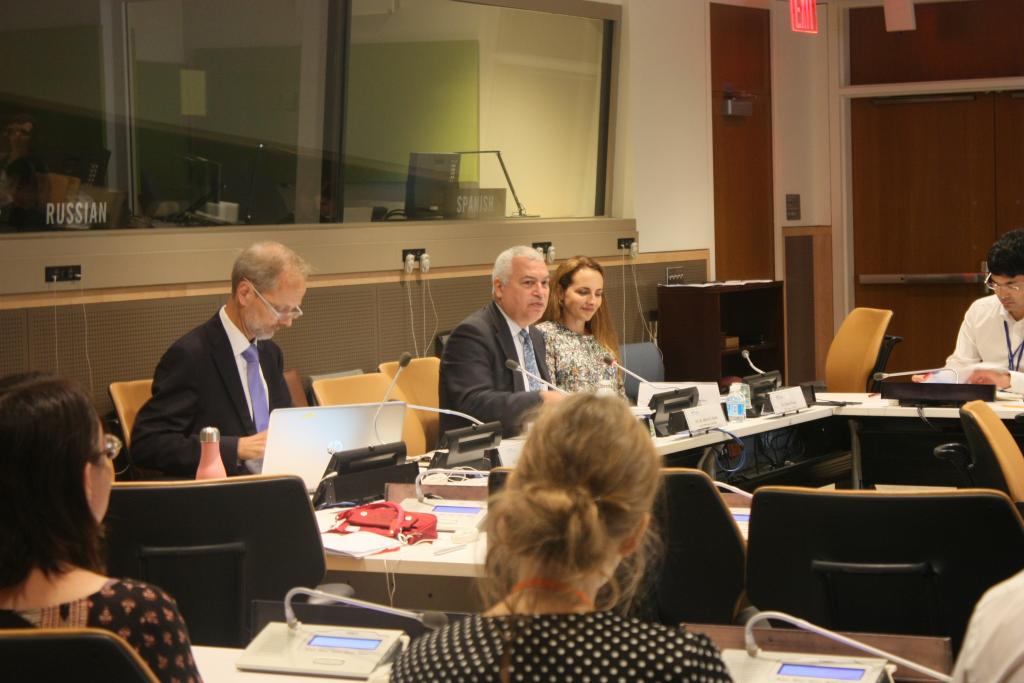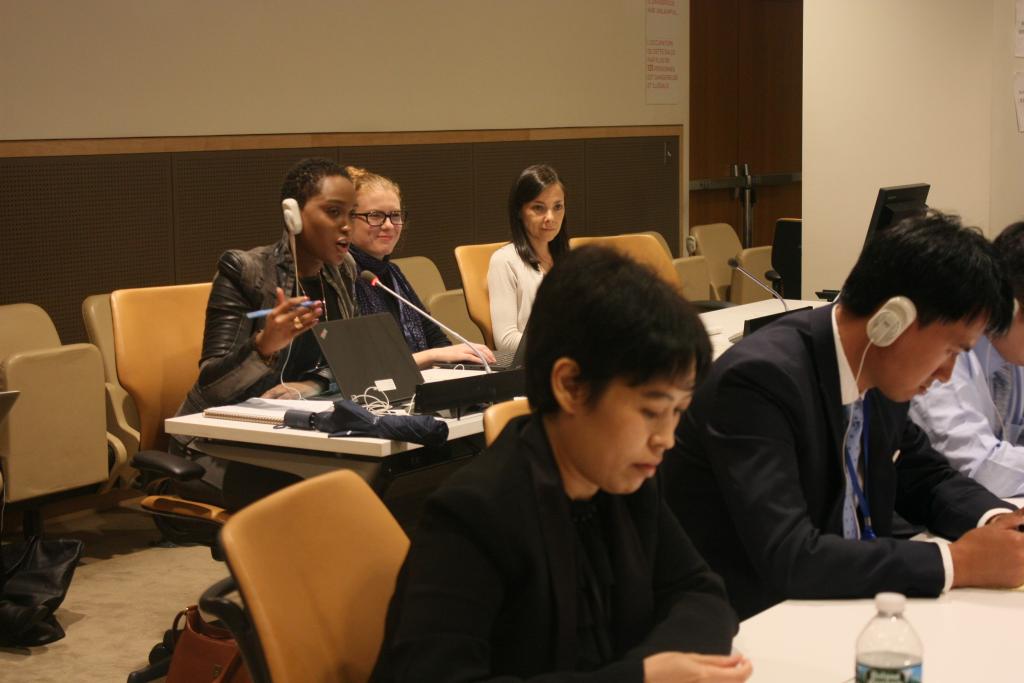Course for New Delegates on the Fifth Committee Continues
6 September 2017 New York, USA – The United Nations Institute for Training and Research (UNITAR) co-organized a course with the Permanent Mission of Switzerland to the United Nations titled “Orientation Course for New Delegates on the 5th Committee”. The course is comprised of several sessions across four days and introduces delegates to the players, topics, and rules and procedures of the United Nations (UN) 5th Committee.
 The second day of the course focused on the 5th Committee’s “Key Topics”, including budgeting, monitoring and evaluation, and auditing and financing. The session was opened with welcome remarks by Mr. Marco A. Suazo, Acting-Head of UNITAR New York Office, and Dr. Colleen Thouez, UNITAR Senior Training and Research Advisor, who also served as moderator for the first half of the session. Both speakers acknowledged the importance of understanding the functions and the integrated nature of the work among actors in the 5th Committee.
The second day of the course focused on the 5th Committee’s “Key Topics”, including budgeting, monitoring and evaluation, and auditing and financing. The session was opened with welcome remarks by Mr. Marco A. Suazo, Acting-Head of UNITAR New York Office, and Dr. Colleen Thouez, UNITAR Senior Training and Research Advisor, who also served as moderator for the first half of the session. Both speakers acknowledged the importance of understanding the functions and the integrated nature of the work among actors in the 5th Committee.
The course continued with three sessions following the first day’s line-up of presentations and panel discussions. The first session was opened by Mr. Johannes Huisman, Director of Programme Planning and Budget Division (OPPBA). Mr. Huisman provided background information and insights on the budgetary cycle and its corresponding legislative mandates, the OPBBA’s legislative framework, monitoring, evaluation and reporting, and the intricacies of results-based budgeting (RBB). He elaborated on the latter by exploring the realities of the stabilizing UN budget and its alignment to the 2030 Agenda and the UN Charter. He also illustrated RBB’s reciprocal relationship with the with the overarching regulatory frameworks of the 5th Committee in the General Assembly’s (GA) decision-making processes.
 Mr. Huisman’s discussion was followed by a joint session on oversight and investigative mechanisms by Mr. David Kanja, Assistant-Secretary-General of the Office of Internal Oversight Services (OIOS), and Mr. Achamkulangare Gopinathan, Inspector of the Joint Inspection unit (JIU), who was present over a video linkage from Geneva, Switzerland. Mr. Kanja began with an introduction of the functions of OIOS, explaining its operational independence, its reports and implementation of its reported recommendations. Mr. Gopinathan followed with a presentation of the JIU’s roles, exemplifying the notion of “value for money”, results-based management (RBM), and JIU’s exceptional mandate as the only body that spans the United Nations System. The discussion with Mr. Kanja and Mr. Gopinathan brought to the table issues of assurance, transparency and independence, reporting, and the formal and informal ways in which the organizations collaborate with each other, and with other relevant parties.
Mr. Huisman’s discussion was followed by a joint session on oversight and investigative mechanisms by Mr. David Kanja, Assistant-Secretary-General of the Office of Internal Oversight Services (OIOS), and Mr. Achamkulangare Gopinathan, Inspector of the Joint Inspection unit (JIU), who was present over a video linkage from Geneva, Switzerland. Mr. Kanja began with an introduction of the functions of OIOS, explaining its operational independence, its reports and implementation of its reported recommendations. Mr. Gopinathan followed with a presentation of the JIU’s roles, exemplifying the notion of “value for money”, results-based management (RBM), and JIU’s exceptional mandate as the only body that spans the United Nations System. The discussion with Mr. Kanja and Mr. Gopinathan brought to the table issues of assurance, transparency and independence, reporting, and the formal and informal ways in which the organizations collaborate with each other, and with other relevant parties.
 The third and final session for the day was led by Ms. Anjana Das, Executive Secretary of the International Civil Service Commission (ICSC), and Wolfgang Stӧckl, Vice-Chairman of the United Nations Civil Service Commission (UNCSC), and moderated by Mr. Suazo. Ms. Das detailed the players and proceedings of the Board of Auditors and its extensive auditing services to various committees, which includes a wide range of products from financial statements to topic-specific reports. The presentation also highlighted the concept of the pyramid of information circulating the UN, and the need to recognize what data is primary and critical in financing and auditing. Mr. Stӧckl furthered the discussion with his overview of the ICSC and the UN Common System. He affirmed the importance of effective human resources management, including managing of salaries, allowances, social security, and other conditions of services across the multilateral global organization. Ms. Das and Mr. Stӧckl jointly addressed issues concerning various clearances processes, data collection, analysis and reporting, the dynamic between internal and external challenges to financial management, and ensuring purchasing power parity across the many UN offices.
The third and final session for the day was led by Ms. Anjana Das, Executive Secretary of the International Civil Service Commission (ICSC), and Wolfgang Stӧckl, Vice-Chairman of the United Nations Civil Service Commission (UNCSC), and moderated by Mr. Suazo. Ms. Das detailed the players and proceedings of the Board of Auditors and its extensive auditing services to various committees, which includes a wide range of products from financial statements to topic-specific reports. The presentation also highlighted the concept of the pyramid of information circulating the UN, and the need to recognize what data is primary and critical in financing and auditing. Mr. Stӧckl furthered the discussion with his overview of the ICSC and the UN Common System. He affirmed the importance of effective human resources management, including managing of salaries, allowances, social security, and other conditions of services across the multilateral global organization. Ms. Das and Mr. Stӧckl jointly addressed issues concerning various clearances processes, data collection, analysis and reporting, the dynamic between internal and external challenges to financial management, and ensuring purchasing power parity across the many UN offices.
The day’s proceedings were closed by Mr. Suazo, who thanked the panellists for their time and expertise, and the participants for their attention and engagement on issues of budget, finance and management. The course will continue with a more focused discussion on human resources and management reform on 7 September 2017.
Photos: Panelists and participants

